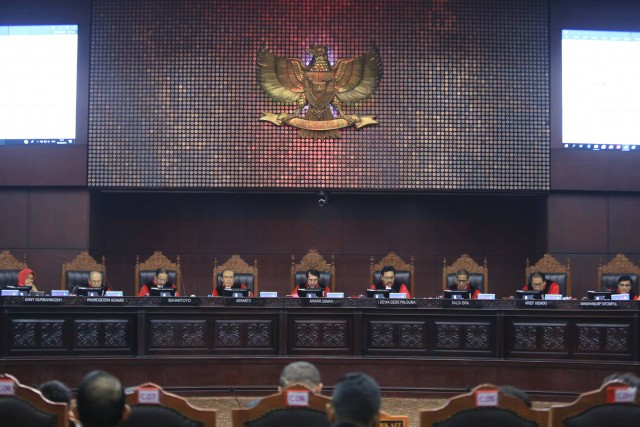Popular Reads
Top Results
Can't find what you're looking for?
View all search resultsPopular Reads
Top Results
Can't find what you're looking for?
View all search resultsConstitutional Court bill would scrap term limits, allow justices to serve until age 70
Critics argue that the bill does not touch the substance of the problems in the Constitutional Court as it focuses only on the tenure of justices.
Change text size
Gift Premium Articles
to Anyone
T
he House of Representatives is planning to revise the Constitutional Court law, seeking to scrap the ten-year term limit for justices and instead set a retirement age of 70 for all members of the nine-justice bench.
According to the draft bill, a copy of which was obtained by The Jakarta Post, the revisions focus on the change of tenure for the justices as well as the eligible age for a candidate to be selected as a Constitutional Court justice.
Article 23 point 1 of the draft bill stipulates that Constitutional Court justices must retire at 70 years of age. The bill scraps the existing provision in Article 22, which stipulates that justices will serve for five years and can be reappointed for only one additional five-year term.
Article 4 of the draft bill extends the tenure of the Constitutional Court chief justice and deputy justice to five years from the current 2.5 years.
The bill also increases the minimum age for a person to be eligible for the position of Constitutional Court justice from the existing 47 years of age to 60 as seen in Article 15 point 2 of the draft bill.
House Legislation Body (Baleg) deputy chairman Willy Aditya of the NasDem Party said the bill was one of seven currently being discussed by lawmakers, which also included the omnibus bill on job creation, the indigenous peoples bill and the state civil apparatus (ASN) bill.
Critics, however, argue that the bill does not touch the substance of the problems in the Constitutional Court as it focuses only on the tenure of justices.
Legal expert Erwin Natosmal Oemar of the Indonesian Public Interest Lawyer Network (PILNET) said there was no urgency for the House to deliberate the bill, especially while the country scrambled to contain the novel coronavirus pandemic.
Erwin further argued that the draft bill reflected a conflict of interest. "It was created only to extend the term of office for justices who will soon retire," he told The Jakarta Post.
Arsul Sani of House Commission III overseeing legal affairs said the bill was initiated by Baleg and that the commission would continue the deliberation.
"Lawmakers in Commission III will discuss the bill and critique it. [The draft] still can change. We welcome public criticism," he told the Post on Thursday.
Similarly, Commission III lawmaker Taufik Basari, who is also member of Baleg, said the contents of the bill could still develop.
"The current draft is still very open for further discussion. It is only a proposal," he said.










